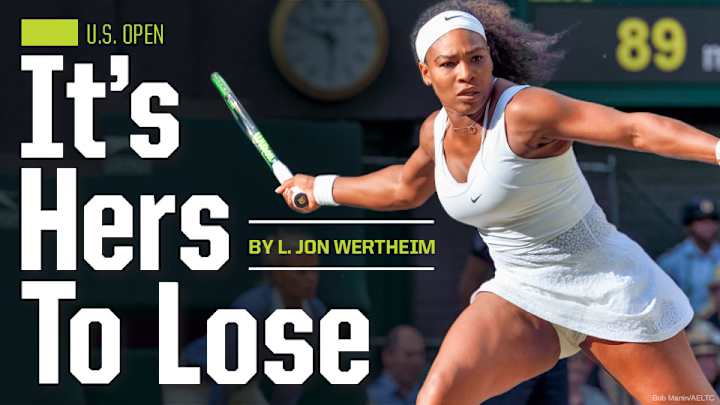Serena Williams enters the U.S. Open with no true rival to stand in her way

This story appears in the August 31, 2015, issue of Sports Illustrated. Subscribe to the magazine here.
At the start of this, her 34th year, Serena Williams undertook a bit of self-reflection. She pondered her persistent need to succeed and the sting that—almost two decades into her pro tennis career—still attends her defeats, rare as they are. "Well," her mother, Oracene Price, suggested offhandedly, "you could always try not losing."
She has heeded Mom's advice. Not only is Serena ranked No. 1, but objects in her rearview mirror appear closer than they in fact are. (For perspective: The points gap separating Serena from No. 2 Simona Halep is greater than the points gap between Halep and the lowest-ranked player on the tour.) Serena is turning in the best year of her career, which is saying something. She is also turning in perhaps the best year in modern tennis history—which is saying still more. Her 2015 record encompasses 48 wins and is pocked with only two defeats, neither of which has come at a major event. Having won the Australian Open, French Open and Wimbledon, she is on the threshold of achieving perhaps the most formidable feat in all of sports.
This summer began with American Pharoah coming to Long Island and winning the Triple Crown. It now ends with Serena coming to a venue seven miles from Belmont Park and trying to finish collecting her sport's ultimate box set. Starting Monday at the 2015 U.S. Open in Queens, tennis's queen will be playing for tennis's elusive Grand Slam.
As is so often the case, tennis does itself no favor in its terminology. Grand Slam hardly connotes a historic act. This season more than 70 grand slams have already been belted in major league baseball, including three in one game in a matchup between the Reds and the Brewers in April. Denny's, that quintessentially unremarkable eatery, has co-opted the term Grand Slam for its breakfast special. Still, in tennis, a Grand Slam is an extreme rarity. A full 27 years have elapsed since Steffi Graf won the last Grand Slam. On the men's side, 46 years have passed since Rod Laver last achieved the same distinction.
2015 U.S. Open preview roundtable: Predictions, dark horses and more
Winning tennis's Grand Slam—or shall we call it the Quadruple Crown?—demands the usual checklist of athletic virtues: sustained excellence. Mental fortitude. Versatility. In other words, winning on four distinct surfaces in four parts of the world. (A match played on Plexicushion-topped asphalt in the scorching heat of Melbourne demands an entirely different skill set from a match played on clay in the spitting rain of Paris.)
Above all, maybe it's just an exercise in focus. In no way diminishing Jordan Spieth's quest for golf's Grand Slam—and acknowledging that he had to beat an entire field over four days, not simply the seven opponents furnished by a winnowing tennis draw—he could shoot a lousy round and still make the cut, putting himself in position to win a major with fine play on Sunday. For Serena? One bad day at the office, one blazingly hot opponent, one niggling injury, one dinner of rancid sushi the night before, and the dance would be over.
Which nearly happened this year. At the French Open, Serena was seldom at her best, pressed to a third set in five of her seven matches. At Wimbledon she was a mere game from losing to 59th-ranked Heather Watson, a young Briton. But the rocky moments gave way, inevitably, to Rocky moments. Each time, Serena picked herself off the canvas and finished the round strong.
She now comes to New York City to try and finish the job. It's her home Slam. It's an event she's won six times, including each of the last three years. It's the site of the first major she won. (Let's pause here and note that in a sport known for brief careers, Serena first won the U.S. Open in 1999, when Bill Clinton was President.) If she were to win it again, it would be her 22nd career major, tying her with Graf. "It does feel like everything is lining up perfectly," says Lindsay Davenport, the '98 U.S. Open champ, now a commentator for the Tennis Channel and part-time coach of rising U.S. star Madison Keys. "But what's really lining up is that Serena has been playing at another level this year."
Serena, famously superstitious, has generally avoided discussing her pursuit of history. At Wimbledon in July she went so far as to issue a moratorium on mentions of the Slam. Afterward she indulged the speculation, at least for a few moments. "It's always something I've thought about, a goal way out there," she said. "It would be pretty cool, wouldn't it?"
Better than cool. It would be grand.

Jon Wertheim is a senior writer for Sports Illustrated and has been part of the full-time SI writing staff since 1997, largely focusing on the tennis beat , sports business and social issues, and enterprise journalism. In addition to his work at SI, he is a correspondent for "60 Minutes" and a commentator for The Tennis Channel. He has authored 11 books and has been honored with two Emmys, numerous writing and investigative journalism awards, and the Eugene Scott Award from the International Tennis Hall of Fame. Wertheim is a longtime member of the New York Bar Association (retired), the International Tennis Writers Association and the Writers Guild of America. He has a bachelor's in history from Yale University and received a law degree from the University of Pennsylvania. He resides in New York City with his wife, who is a divorce mediator and adjunct law professor. They have two children.
Follow jon_wertheim